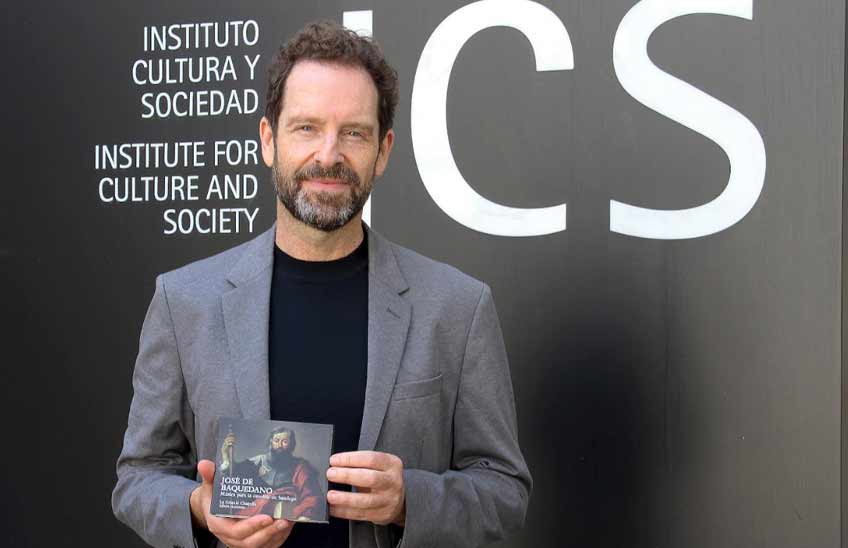The musicologist Albert Recasens has recovered unpublished works in Latin from the Baroque Spanish composer José de Baquedano
After carrying out an exhaustive musicological study, the University of Navarra researcher and director of the La Grande Chapelle ensemble released a CD with outstanding vocal pieces from the Navarrese composer

FotoBerta Viteri<br>/Albert Recasens, investigador del grupo 'Creatividad y herencia cultural del ICS y director de la Grande Chapelle.
14 | 06 | 2022
Albert Recasens, an Institute for Culture and Society (ICS) researcher at the University of Navarra and director of the La Grande Chapelle, has recovered unpublished music by José de Baquedano (1642-1711), the famous singer, composer and chapel master of the Cathedral of Santiago de Compostela. Leading his musical group, he has recorded some of the most outstanding works by the composer and has published them on the CD José de Baquedano. Music in Latin for the Cathedral of Santiago.
The album, edited by Lauda, focuses on Baquedano's Latin vocal repertoire, with a selection of motets, psalms and Holy Week music for a maximum of twelve voices. Their recording of the Miserere psalm for ten voices stands out for how it follows the interpretive practice of the time, as does the use of the original template in the Maundy Thursday lamentation for six voices with arch vihuelas.
Albert Recasens has carried out a rigorous research, the parallel musicological study and the coordination of the transcription of the works, following the scientific methodology he has applied in previous recoveries of other Spanish composers of the 16th, 17th and 18th centuries. To do so , he has turned to the collections of the file of Santiago Cathedral, where most of the manuscripts of this Navarrese master are kept. The work of recovery is part of the project of research that Recasens develops in the group ''.Creativity and Cultural Heritage' of the ICS.
José de Baquedano was born in Puente La Reina, an enclave on the Way of St. James. As a child, he began his training there and later looked for work as a singer in Bilbao, San Sebastián, Vitoria and Segovia. Later, he moved to Madrid, where he began to establish his reputation. Based on his merits, the Cathedral of Santiago appointed him chapel master in 1680, where he served until 1710.
Symbiosis of a modern style and traditional polyphonic language
"Baquedano's production offers, as in other composers of his generation, an admirable symbiosis of modern style - with Italianising melodic twists, daring harmony, chromaticism or soloist interventions - and the traditional polyphonic language that prevailed in Hispanic ecclesiastical centres", emphasised the musicologist and researcher of the ICS.
“In most productions for eight or more voices – masses, psalms, songs or lamentations – the polychoral style, so popular in European Catholic temples in the second half of the seventeenth century, predominates” he further detailed. “In these works with several choirs, sections based on imitative counterpoint and others with a homophonic texture are linked.”
Recasens pointed out that the figure of Baquedano has piqued the interest of musicologists and performers since the 1950s: “There have been pioneers in the efforts to recover his music working within institutions such as the Cathedral of Santiago or the University of Santiago, or sponsored by public administrations.” However, he pointed out that only a small portion of his work has been recorded “and it is not at all proportional to the importance and artistic quality of his preserved production.”
This work was presented during a seminar in which the following speakers participated: Ofelia Rey Castelao, from the University of Santiago de Compostela; Robert L. Kendrick, from the University of Chicago (USA); and Albert Recasens. Cristina Diego Pacheco, from the University of Lorraine (France), moderated the session. This activity received the Mecna distinction for cultural patronage from the Government of Navarra.
Of note, the pieces on the CD premiered on June 24, 2021 during a concert at the Cathedral of Santiago de Compostela within the framework of Xacobeo 2021-22. The Center for Hispanic Europe Studies (CEEH for its initials in Spanish) consulted on both the concert and the recorded edition.
